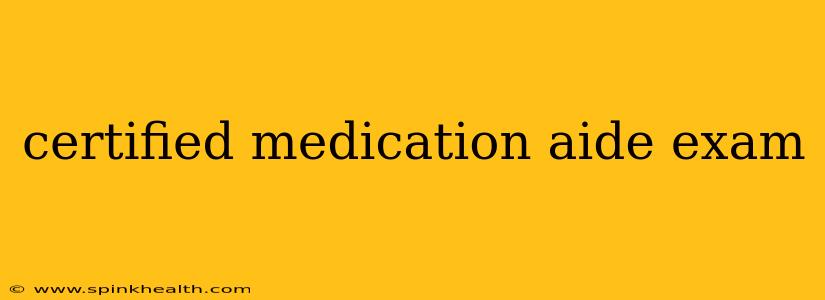The journey to becoming a Certified Medication Aide (CMA) is a rewarding one, filled with the satisfaction of directly impacting the lives of others. But before you can begin your career assisting residents with their medications, you must navigate the CMA exam. This comprehensive guide will walk you through everything you need to know, from preparation strategies to common questions and anxieties. Think of it as your roadmap to success.
My name is Sarah, and I've been a registered nurse for over 15 years, with extensive experience in training and mentoring CMAs. I understand the challenges and rewards of this profession, and I'm here to share my insights to help you confidently tackle the exam.
What is the Certified Medication Aide Exam?
The CMA exam is a standardized test designed to evaluate your knowledge and competency in safely administering medications to residents in assisted living facilities, nursing homes, and other long-term care settings. Passing the exam demonstrates your readiness to handle this crucial responsibility, ensuring the well-being of those under your care. The specific content and format of the exam vary by state, so it's crucial to check with your state's board of nursing or the relevant regulatory body for precise details. However, the core principles remain consistent across all jurisdictions.
What Topics are Covered on the CMA Exam?
The CMA exam covers a broad range of topics essential for safe medication administration. Expect questions on:
- Medication knowledge: This includes understanding different drug classifications, their indications, contraindications, side effects, and interactions.
- Dosage calculations: Accurate dosage calculation is critical, so be prepared for various calculation problems.
- Medication administration routes: This section covers the different ways medications are administered (oral, topical, injection, etc.), and the proper techniques for each.
- Legal and ethical considerations: You'll be tested on relevant laws and regulations governing medication administration, as well as ethical principles guiding patient care.
- Documentation: Accurate and thorough documentation is non-negotiable. Expect questions on proper charting procedures and record-keeping.
- Resident rights and safety: Protecting residents' rights and ensuring their safety are paramount. The exam will cover this in detail.
- Observation and reporting: Recognizing and reporting adverse reactions or changes in resident conditions is a critical skill.
How to Prepare for the CMA Exam: A Step-by-Step Guide
Preparation is key to success. Here's a structured approach to maximize your chances of passing:
-
Understand the Exam Content: Begin by thoroughly reviewing the specific content outline provided by your state's regulatory body. This will give you a clear picture of what to expect.
-
Utilize Study Materials: Invest in high-quality study materials. This may include textbooks, practice tests, and online resources specifically designed for the CMA exam.
-
Create a Study Schedule: Develop a realistic study schedule that allows you ample time to cover all the topics. Consistent, focused study is more effective than cramming.
-
Practice, Practice, Practice: Take advantage of practice tests and quizzes. This will help you identify areas where you need further study and familiarize yourself with the exam format.
-
Seek Mentorship or Support: If possible, connect with experienced CMAs or nursing professionals for guidance and support. Their insights can be invaluable.
-
Get Adequate Rest and Manage Stress: Ensure you get enough sleep and manage your stress levels. A well-rested and calm mind is more receptive to learning and problem-solving.
Frequently Asked Questions (FAQs)
How long is the CMA exam?
The length of the exam varies depending on your state. Some are shorter, others longer. Check with your state's regulatory board for precise details.
What type of questions are on the exam?
Expect a mix of multiple-choice, fill-in-the-blank, and possibly some scenario-based questions.
What happens if I fail the exam?
If you don't pass the exam, you'll typically have the opportunity to retake it after a waiting period. Consult your state's regulations for specifics on retakes.
Are there specific requirements to take the CMA exam?
Requirements vary by state. You'll generally need to complete a state-approved training program and meet certain eligibility criteria. Check your state’s rules and regulations.
What are the career opportunities after becoming a CMA?
Successful completion of the CMA exam opens doors to a fulfilling career in long-term care, providing essential medication assistance to residents and contributing to their overall well-being.
Conclusion: Your Path to CMA Certification
Becoming a Certified Medication Aide is a challenging but ultimately rewarding journey. By diligently preparing, utilizing available resources, and maintaining a positive attitude, you significantly increase your chances of success on the CMA exam and embark on a fulfilling career dedicated to providing exceptional care. Remember to always consult your state's board of nursing for specific requirements and details related to the CMA exam. Good luck!

